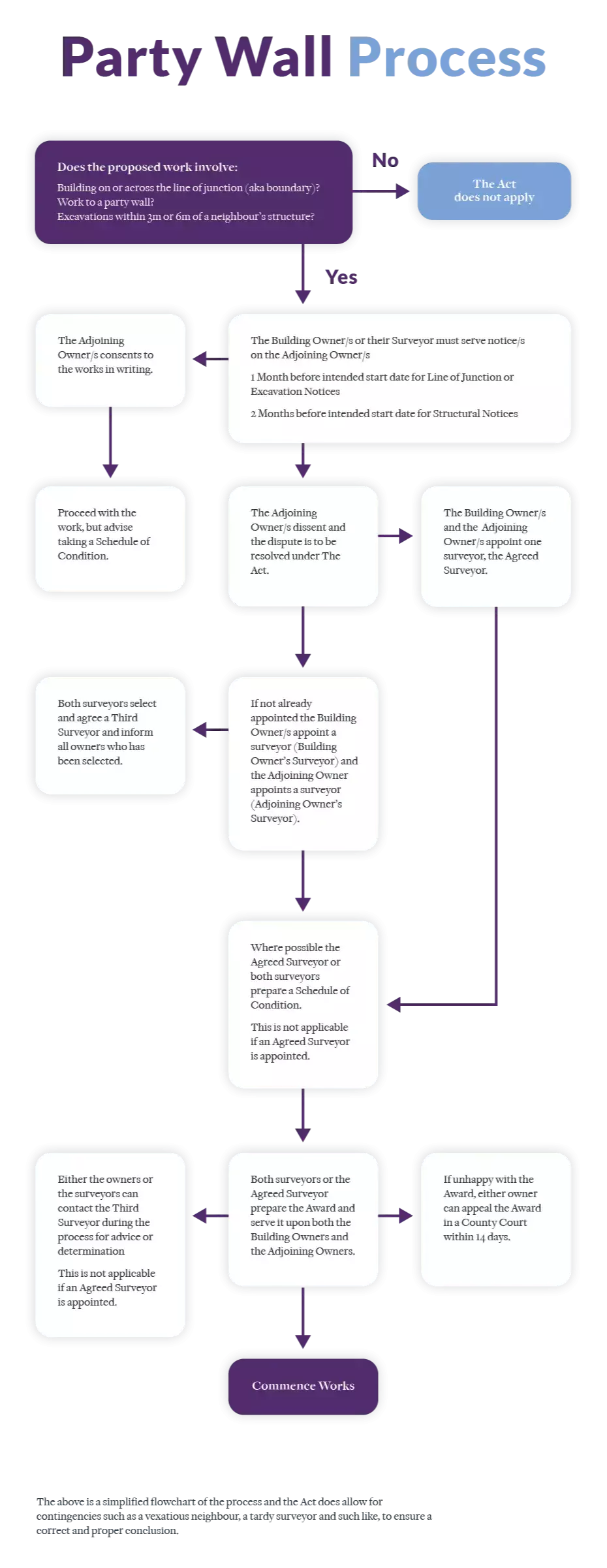Party Wall Agreements
Protect your investment with clear, practical guidance from our honest, approachable experts – 020 8642 2999

While many people refer to it as a “party wall agreement,” the correct legal term is a Party Wall Award, a legally binding document prepared under the Party Wall etc. Act 1996. On this page, we use both terms to help you find the right information while ensuring legal accuracy.
Planning building works on or at a boundary, near another building, or to a party wall?
Whether you’re extending your home, converting your loft, removing a chimney breast, or other works that fall within the Party Wall etc. Act 1996; we’re here to help you stay compliant and keep neighbourly relations on good terms.
From internal alterations to extensions and loft conversions, our specialists in party wall
matters provide a comprehensive service – from serving legally valid notices to undertaking detailed Schedules of Condition and producing thorough Party Wall Awards under the Party Wall etc. Act 1996.
Our RICS-qualified Party Wall Surveyors guide you through every step of the process. Whether you're planning works or have received a notice, we offer honest, impartial advice to help you protect your property and maintain good neighbour relations.
Speak with a Party Wall Surveyor about your plans today.
What is a party wall?
A party wall is any wall or structure shared between two properties. Common examples include the walls between terraced or semi-detached houses.
If you're:
- Building an extension
- Converting a loft with steel beams
- Removing chimney breasts
- Excavating near a neighbouring structure
...you may need to serve a Party Wall Notice and have a Party Wall Award in place before starting work.
The Party Wall etc. Act 1996 provides a framework for preventing and resolving disputes between neighbours during such works. It has existed in some form since the aftermath of the Great Fire of London in 1667, and it continues to serve as a balance between protecting adjoining owners and enabling responsible development.
What our clients say
“As novices to the world of party wall agreements and loft conversions, Steven was absolutely fantastic. I cannot emphasise this enough. His patience, thoroughness, attention to detail and step-by-step guidance through what was a stressful process was out of this world. The service that Steven (and Arnold & Baldwin) provided was nothing short of sensational. I cannot recommend Arnold & Baldwin highly enough – a pleasure and delight to deal with. I will certainly be using them for future projects.”
– Homeowner in South London
Who qualifies as an 'Owner' under the Act?
Under the Party Wall etc. Act, an 'Owner' is defined as anyone with a legal interest in the property that lasts for more than 12 months.
This includes:
- Freeholders
- Leaseholders (with a lease over 12 months)
It does not include:
- Tenants on assured shorthold tenancies (ASTs)
- Mortgagees or those with only a licence interest
Both Building Owners and Adjoining Owners fall under this definition when notices are served.
What does a Party Wall Surveyor do?
A Party Wall Surveyor is a qualified professional who acts impartially under the Party Wall etc. Act.
Their role is to:
- Review plans and assess whether the Act applies
- Serve or respond to valid party wall Notices
- Prepare a Party Wall Award (the legal document)
- Undertake detailed Schedules of Condition
- Resolve any party wall disputes fairly and efficiently
They may act for building owners, adjoining owners, or as an agreed surveyor for both. Appointed surveyors act independently – even if chosen by one party – and their appointment cannot be unilaterally terminated. Their role is a bit like that of a referee – they don’t take sides, but make sure everything is handled fairly and correctly under the law.
Who pays for a Party Wall Surveyor?
In most cases, the building owner (the person doing the work) is responsible for all reasonable Party Wall Surveyor costs – both their own and their neighbour's, if needed. This reflects the principle that it is the builder’s responsibility to safeguard neighbouring properties during their project.
There are exceptions – for example, where the works benefit both parties or when a neighbour acts unreasonably. We provide transparent pricing so you always know where you stand.
How much does a Party Wall Surveyor cost?
Costs vary depending on the nature of the works, how many properties are affected, and whether one or two surveyors are needed. At Arnold & Baldwin, we offer:
Transparent fixed fees when working as the Building Owner’s Surveyor
Fair and reasonable hourly rates when working as the Adjoining Owner’s Surveyor
We’ll always talk you through the options and what to expect – no hidden surprises.
Do I always need a party wall agreement?
Not every project requires one, but many do – and failing to serve valid Notice(s) puts building owners at risk of legal action, including potential injunctions and delays. If you’re unsure, we offer quick, no-obligation guidance.
Even when neighbours initially consent, they are entitled to dissent later if issues arise – so it’s often best practice to prepare a Schedule of Condition regardless.
Read more about Party Wall agreements in our simple guide for homeowners and renovators.

Party wall procedure: Timeline, rights and duties
The Party Wall etc. Act 1996 provides a clear legal process to protect both Building Owners and Adjoining Owners. Here's how it typically unfolds:
1. Notice(s) served – Building Owners or their Surveyor must serve a written notice on all Adjoining Owners if they plan works covered by the Act. Depending on the type of work, the notice must be served at least 1 or 2 months before the proposed start date.
2. Response from Adjoining Owner – Adjoining Owners have 14 days to respond. They can either:
- Consent to the works (typically for low-risk or minor works), or
- Dissent, which triggers the surveyor process.
- Non-response is treated as dissent.
If no response from the Adjoining Owner(s), a further 10 days to respond should be given.
Even after initially consenting, an Adjoining Owner may raise a dispute at any time before or during the works.
3. Appointing surveyors – If there is dissent:
- Both parties appoint their own surveyors, or
- They may agree to appoint one Agreed Surveyor to act for both.
Surveyors cannot be dismissed once appointed and must act impartially – even if chosen by one party.
4. Surveyor duties and Award – The appointed surveyor(s):
- Assess the planned works
- Review any risks to adjoining structures
- Prepare a legally binding Party Wall Award which sets out rights, responsibilities, access arrangements, and may include a Schedule of Condition
5. Third Surveyor – If the two surveyors cannot agree, they refer the matter to a pre-selected Third Surveyor who will make a final determination.
6. Commencing works – Once the Award is served and any notice period has elapsed, works may begin. Surveyors may carry out follow-up inspections during or after works.
7. Appeals and enforcement – Awards are enforceable by law. If either party believes the Award is unfair or improperly made, they may appeal to the County Court within 14 days – though this is rare.
This process is designed to protect everyone involved – so that work can go ahead legally, safely, and with minimal disruption.
8. If surveyors cannot agree – In rare instances where the two appointed surveyors are unable to reach agreement, one of them (with permission from their appointing owner) will refer the matter to the Third Surveyor. This individual, selected at the outset, will make a final decision and issue their own Award. The Third Surveyor will also set their own fee, which is usually payable by the Building Owner, but may be charged to the Adjoining Owner if their actions are deemed to have been unreasonable or vexatious
A neighbourly approach
The Act is an enabling piece of legislation: it allows work to proceed legally and with proper oversight. It also grants access rights to neighbouring land when needed.
It’s normal for neighbours to have concerns – but dissent under the Act isn’t personal. It’s just a way to make sure the right protections are in place.
Likewise, building owners should not avoid their obligations. Skipping notices or trying to sidestep the process can result in costly legal action and strained relationships.
Our role is to maintain fairness, clarity and peace of mind for both sides.
Want to understand if you need a party wall agreement?
Read our simple homeowner’s guide to learn when the Act applies, what’s required, and how to avoid costly delays or disputes.
Frequently asked questions
Can my neighbour stop my work from going ahead?
Not if you follow the correct process. The Act is designed to allow works to go ahead, provided proper notice is given and any disputes are resolved through surveyors.
What happens if we can’t agree?
That’s exactly what the Party Wall process is designed for. Once surveyors are appointed, they take over and act impartially to settle any dispute. If there’s disagreement between surveyors, a Third Surveyor will make a final decision.
Do I need a solicitor?
Not usually. Party wall matters fall within a surveyor’s expertise – we understand both the legal framework and construction context. However, you can always seek legal advice if you feel it’s necessary.
Is a Party Wall Award legally binding?
Yes. Once made, the Award is enforceable. It protects both owners and can only be appealed via the County Court (which is rare) within 14 days.
Why choose Arnold & Baldwin?
- RICS-Registered Surveyors with deep legal and construction knowledge
- Full party wall support – from initial notices to final inspections
- Clear advice on your legal obligations and neighbour relations
- Impartial guidance with your project’s success in mind
We work efficiently to keep your project moving, while making sure everyone’s interests are protected.
Need to serve a Party Wall Notice or respond to one?
Get in touch today – call our honest, approachable experts for tailored advice on:
020 8642 2999
Whether it's your building, property or home, our award-winning property experts can help
Which Property Survey?
Get in Touch
Our property experts are here to help you